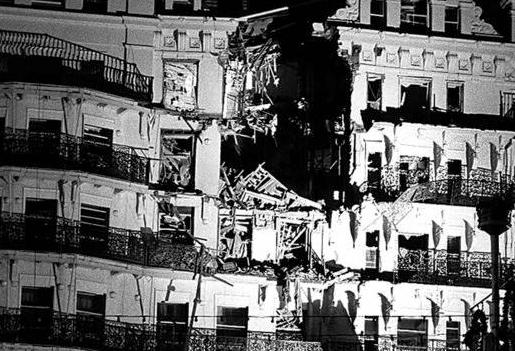1984 Brighton bomb officers in `cancer-exposure risk` after detective`s death
Thirty police officers caught up in the wake of a failed bid to assassinate former Prime Minister Margaret Thatcher 30 years ago are facing a deadly new threat from cancer-related asbestos.
Jun 23, 2016
By Nick Hudson
Thirty police officers caught up in the wake of a failed bid to assassinate former Prime Minister Margaret Thatcher 30 years ago are facing a deadly new threat from cancer-related asbestos.
Rescuers who worked at the scene of the 1984 Brighton bombing have been told they could be at risk following the death last December of Metropolitan Police Service (MPS) detective Jonathan Woods.
He got mesothelioma an incurable cancer caused by asbestos fibres lodging in the lung lining after being exposed while sifting through the rubble.
Five people died and 31 people were injured when the bomb, planted by the IRA`s Patrick Magee, detonated on the sixth floor of the Grand hotel.
Police, fire and ambulance personnel who were involved in the aftermath of the attack may also been exposed to asbestos through contact with the debris.
Letters are also being sent to Conservative Party members, Brighton and Hove City Council and Sussex University Hospital NHS Trust telling them their staff may also be affected, police said.
The family of the MPS officer is taking legal action against Sussex Police claiming it did not adequately protect him from the risks of asbestos.
The force is now urging others who worked at the bomb site to see their doctors in case they were also exposed.
Solicitor Andrew James representing Mr Woods` family told The Argus: “When the bomb blew up, it collapsed the building into the basement.
“Jonathan Woods and 15 MPS and 15 Sussex Police officers picked through the dust in the basement, which it turns out was contaminated with blue asbestos, but weren`t protected.
“Jonathan Woods is the first MPS officer that we know of to have developed mesothelioma as a result of this.
“I know Sussex Police is concerned that 15 of its officers could also have been exposed.
“In 1984 they would definitely have known the risks of asbestos. There had been a big publicity campaign a couple of years before.
“It can be 60 years before the effects start to show themselves, but once you are exposed you are always at risk.”
Sussex Police assistant chief constable Steve Barry, who is co-ordinating an emergency services group, stressed the possibility people may have been affected is “very small”.
He felt he had an “ethical duty” to tell people that a Metropolitan Police officer who worked at the scene died from an asbestos-related disease last December.
Mr Barry said: “We are trying to identify and inform emergency service colleagues and others who may have been exposed to asbestos fibres to offer medical advice and support.
“I understand that on hearing this news people may be anxious as to whether they have been exposed to asbestos and concerned about the possible effects on their health.
“I would like to emphasise that the possibility that they have been affected is very small, but I feel it is the right thing to pass this information on.
“People could have potentially been exposed to asbestos fibres within the hotel debris and while we know that police officers working at the scene were issued with personal protective equipment, this was some days after the explosion.”
Sussex Police said it was offering its officers health information and support.
Mr Barry said: “By publicising this issue, I don`t wish to cause distress but inform people so they can seek health advice from their GP and to reassure them that the possibility that they have been affected is very small.”


